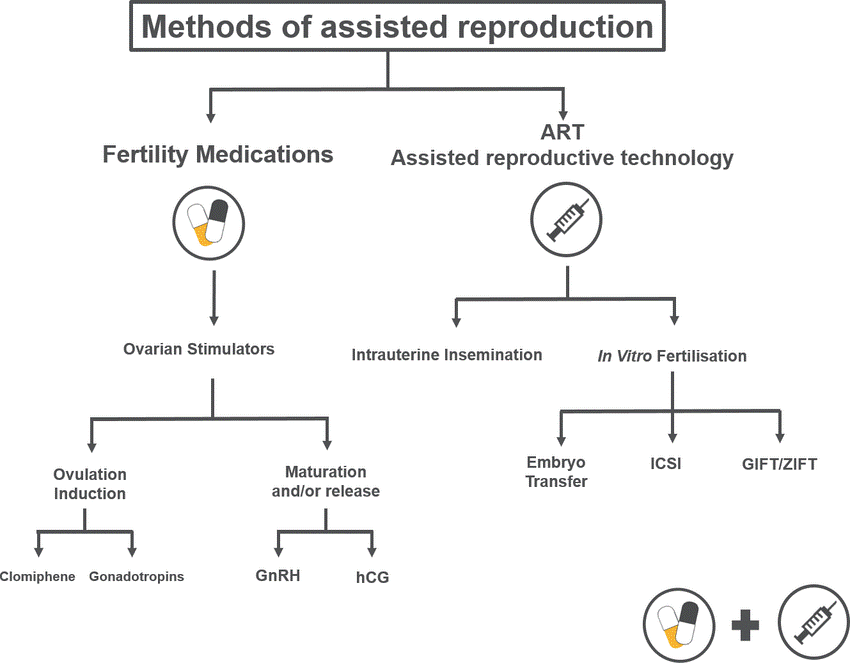12 Jan Assisted Reproductive Technology (ART)
Assisted Reproductive Technology (ART)
This article covers “Daily current affairs for UPSC” and the topic is ‘Assisted Reproductive Technology (ART )’ which is in the news, it covers “Government policies and interventions, scientific innovations and discoveries” In GS-2 and GS-3, the following content has relevance for UPSC.
For Prelims: About Assisted reproductive technology, health, ART regulations act
For Mains: GS-2, GS-3, Government policies and interventions, Health aspects of women, Impact of ART regulation act, 2021
Why in news:
According to the Kerala High Court, deciding whether to start a family is a fundamental right and placing an age restriction on it is a restriction that has to be reviewed.
About Assisted Reproductive Technology
- This definition states that all fertility therapies that deal with either eggs or embryos are considered to be ART. In general, ART treatments entail surgically removing eggs from a woman’s ovaries, fertilizing them in a lab with sperm, and either putting them back into her body or giving them to another woman.
- They exclude procedures where only sperm are treated (such as intrauterine—or artificial—insemination) or where a woman takes medication solely to increase egg production without intending to have eggs extracted.
Concern Associated
- When deciding on several petitions contesting the age requirement of 50 for women and 55 for men outlined in the Assisted Reproductive Technology (ART) (Regulation) Act, 2021, for undergoing assisted reproductive technology, the court issued the directive.
- The petitioners contend that the ART Act’s Section 21(G) prescription of the upper age restriction is arbitrary, unjustified, and a violation of their right to reproduction, which is recognized as a basic right.
- They attempted to have it ruled unconstitutional.
- The National Assisted Reproductive Technology and Surrogacy Board has been instructed by the High Court to inform the Union government that the maximum age limit for utilizing assisted reproductive technology has to be reviewed.
- In addition, the petitioners have contested the clause that includes medical professionals in the scope of the Indian Penal Code (IPC) and makes offenses cognizable.
- Due to the threat of legal action, these regulations are having a chilling effect on IVF practitioners across the nation, preventing them from carrying out their professional responsibilities.
About the Assisted Reproductive Technology (Regulation) Act, 2021
Legal Requirements
A system for implementing the ART (Regulation) Act 2021 is provided.
By establishing the National Assisted Reproductive Technology and Surrogacy Board, the ART (Regulation) Act 2021 offers a structure for carrying out the surrogacy law.
The Act aims at regulating and monitoring ART clinics and banks, preventing misuse, and ensure the safe and moral provision of ART services.
ART Services are as follows
The Act defines ART as any method that attempts to conceive a child by handling the sperm or oocyte (immature egg cell) outside of the body and transferring the gamete or embryo into the female reproductive system. These include gestational surrogacy, in vitro fertilization (IVF), and sperm or egg gamete donation.
The following channels will offer ART services
- ART banks, which collect, filter, and store gametes, as well as
- ART clinics, which provide ART-related treatments and procedures.
Donor Eligibility Requirements
Males and females between the ages of 21 and 55 may provide semen, and females between the ages of 23 and 35 may provide eggs. Only one egg donation is allowed per woman’s lifetime, and no more than seven eggs may be taken from her. A bank is not allowed to provide a single donor’s gametes to more than one commissioning party (i.e., couples or single women seeking services).
Conditions for Offering Services
Only with the donor’s and commissioning parties’ written approval may ART treatments be performed. To protect the egg donor, the commissioning party must provide insurance (for any loss, damage, or death).
Rights of a Child Born Through ART
A Child Born Through ART Will Be Considered a Biological Child Of The Commissioning Couple And Will Be Entitled To The Rights And Privileges Available To A Natural Child Of The Commissioning Couple. A donor won’t have any parental responsibilities for the child.

Assisted Reproductive Technology (ART)
Shortcomings
- Unmarried and heterosexual couples are excluded
The Act prohibits transgender people, married or unmarried homosexual couples, divorced or widowed homosexual couples, and unmarried but cohabiting heterosexual couples from utilizing ART services.
This exclusion is important since the Surrogacy Act forbids the aforementioned individuals from using surrogacy as a means of reproduction.
- Reduces Reproductive Options: The Act is only applicable to commissioning couples who are infertile, or who have been unable to conceive after a year of unprotected coitus. The reproductive options of individuals who are excluded are thus much diminished and its applicability is constrained.
Prices are not regulated, but this is something that can be fixed with a few straightforward instructions.
Way ahead:
- Independent groups, not clinic ethics committees, should give the required counseling, not patients.
- The directives of the federal and state governments should be binding on all ART entities since they serve the national interest, good relations with other countries, and the public interest.
- Before having an impact on millions, all raised constitutional, medico-legal, ethical, and regulatory concerns must be carefully examined.
Source:
Download PDF now:
Plutus IAS Current Affairs eng med 12th Jan 2023
Daily Current Affairs for UPSC
The preparation for the UPSC examination becomes incomplete for any UPSC aspirant without reading daily current affairs. So, every IAS aspirant should read Current Affairs regularly to familiarize themselves with the latest news of the national and international world. Here, Plutus IAS delivers the best daily Current Affairs for the UPSC examination free of cost. Today, Collect them and read them properly. Also, get the weekly and monthly current affairs for IAS exam preparation.



No Comments